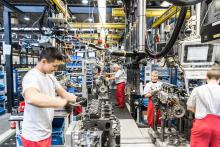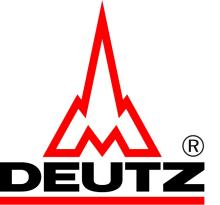
New orders received by Deutz fell by 34.6% year on year to €623.6m.
The German company added that demand slumped due to customers continuing to sell the inventories of engines they had built up before new emissions standards came into force, which had already led to a low level of orders on hand at the end of 2019, and due to the macroeconomic impact of the coronavirus pandemic in what was already a challenging market environment.
Business operations were also significantly disrupted during the first six months of the year as a result of a temporary production shutdown and the introduction of short-time working.
“Despite the current situation, we believe we are on the right track to be able to achieve our medium-term targets,” said Deutz CEO Dr Frank Hiller.
Commenting on Deutz's Transform for Growth efficiency programme launched at the start of this year, he added: “To be competitive in the long term and ensure the company stays on course for success, it is vital that we regularly review our processes and structures. We have done this and we expect implementation of the resulting action plan to generate annual cost savings totaling around €100m from the end of 2022.”
The company's Construction Equipment, Material Handling, Agricultural Machinery, and Stationary Equipment application segments recorded double-digit percentage reductions in new orders. By contrast, the Miscellaneous application segment and the service business notched up further increases of 16.4% and 0.8% respectively. The sharp rise in the Miscellaneous application segment was primarily due to the growth in new orders for rail vehicle drive systems.
As at June 30, 2020, orders on hand stood at €253.5m (June 30, 2019: €462.6m).
The Deutz Group sold a total of 73,859 engines in the reporting period, which was 27.3% fewer than in the first half of 2019. Miscellaneous was the only application segment with an increase in unit sales, registering a substantial rise of 112.7% that was largely attributable to the introduction of small outboard motors known as trolling motors. The ramp-up of these motors enabled Deutz subsidiary Torqeedo to more than double its sales of boat motors to a total of 16,244, which equates to a year-on-year rise of 163.8%.
In the EMEA region (Europe, Middle East, and Africa), Deutz’s biggest sales market, unit sales went down by 30.5% compared with the prior-year period to 37,763 engines. In the Americas region, unit sales fell by 47.4% to 14,726 engines. By contrast, unit sales in the Asia-Pacific region grew by 10.8% owing to the aforementioned ramp-up at Torqeedo.
The Deutz Group’s revenue fell by 33.3% compared with the first six months of 2019 to €620.0m. Revenue declined across the board, from both a regional and an application segment perspective.
Deutz reported an operating loss (EBIT before exceptional items) of €49.9m in the first half of 2020. This significant decline compared with the prior-year period was attributable, in particular, to the fall in revenue and the resulting diseconomies of scale. There was also a heavy drag on operating profit from payments of around €10m made under continuation agreements with suppliers that are going through insolvency proceedings and demand-related impairment losses of around €5m recognised on capitalised development projects. However, there were some positive influences on earnings performance in addition to the general cost reductions and the use of short-time working: The Board of Management waived its one-year variable remuneration for 2020 and senior managers waived a substantial part of their variable remuneration for 2020. The EBIT margin stood at minus 8% in the reporting period, compared with 5.1% in the prior-year period.
Despite the currently difficult situation, Deutz has reaffirmed its current outlook for 2022, when it expects to generate revenue in excess of €2bn and an EBIT margin before exceptional items in the range of 7% to 8%.
The company says growth is likely to be driven mainly by the continued internationalization and rapid expansion of the service business, but also by the expansion of the core business and the further development of the product portfolio. As a result, Deutz is also adhering to its revenue target for the service business, which it has brought forward to 2021 and envisages revenue of over €400m.
A total of 380 jobs have already been cut in the first half of this year, partly by reducing the number of temporary workers. Following on from this, Deutz is planning to launch a voluntary programme encompassing a further 350 jobs at its sites in Germany. The remaining reduction in headcount is to be achieved by the end of 2022 as fixed-term contracts come to an end and through natural attrition.
“Our utmost objective is to avoid compulsory redundancies and find a socially responsible solution for our employees," said Hiller. "We have therefore already entered into an ongoing dialogue with the employee representatives to discuss the details of a voluntary programme."








